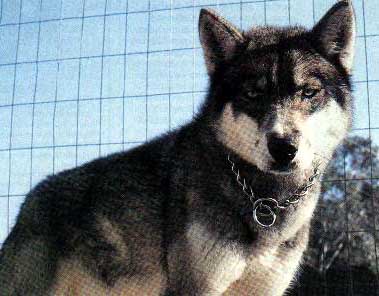|
An
AMERICAN dog thought to be extinct at the turn of the century
is now making a comeback, thanks to the efforts of a breeder in
rural California.
Although it is still considered a rare breed, the American Indian
Dogs now have a good chance of surviving into the 21st century
and beyond. Kim La Flamme, the founder and president of the American
Indian Dog Club, has been fighting for this breed for the past
20 years. In his youth, he played with the dogs owned by his grandfather,
who was part Blackfoot Indian. It was a surprise when LaFlamme
found out, as an adult, that the dogs were thought to have died
out.
Kathryn McKenzie Nichols is a freelance writer in Central California,
and animals are one of her favorite topics. Her articles have
appeared in a variety of publications, including Pacific Monthly,
Seventeen and Monterey Life magazines. "I couldn't find any
other dogs to keep the line going." he said, and so started
his odyssey to discover others to breed to those owned by his
family.
La Flamme made contact with zoologists and archaeologists to research
the breed's history. They discovered that the dogs may have been
the first breed domesticated in North America, perhaps as far
back as 30,000 years ago. The medium-size dogs resemble coyotes,
which are believed to have been the dogs' ancestors.
Each native American tribe used the dogs for different purposes.
Some helped hunters by tracking or hauling loads. Others guarded
villages and even "babysat" youngsters, herding them
back to safety as needed. One tribe bred the dogs for their
hair, which was used in weaving. Still other tribes considered
the dogs sacred, and the animals took part in religious ceremonies.
When Europeans first came to America, they took note of the Indians'
dogs. A Jesuit priest wrote that among the Huron Indians, the
dogs "are held as dear as the children of the house, and
share the beds, plates and food of their masters."
As native Americans were consigned to reservations in the 1800s,
their dogs went with them. Many of the animals had been killed
defending their villages from settlers, were eaten by their starving
masters, or returned to the wild, according to La Flamme, so their
numbers declined dramatically.
But here and there, some of the purebred dogs survived. La Flamme
managed to locate about 17 of them. Now there are 120 dogs in
the AIDC registry. The dogs, which belong to the Spitz family,
are lightly built, with medium-length hair, bushy tails and longish
pricked ears. Their coloring may be black, cream. golden red,
gray, fawn or silver, with eye color ranging from yellow to amber.
Some light-colored dogs---thought to be descended from the "sacred
dogs"- have blue eyes. The breed should not be confused with
coyote or wolf crosses, according to La Flamme. "You can
create the look of the breed through crosses, but not the personality."
he said. The American Indian dog can be somewhat shy around strangers,
but it is fiercely loyal to its human family. Despite their strong
protective instincts, the dogs are not aggressive. Intelligent
and agile, they make excellent working dogs. "My grandfather
used to say that one of them (herding) could replace five men
on horseback," said La Flamme. La Flamme takes his dogs to
a variety of events to spread the word about the breed. The dogs
have appeared at native American gatherings as well as at the
annual exposition of the Beverly Hills Kennel Club in Southern
California.
Although some registries have shown interest in the breed, La
Flamme said he would prefer to keep the Indian dog as a working,
rather than show, animal. Breeding is tracked on the club's computer
to avoid inbreeding when matching up mating pairs. La Flamme also
writes a monthly newsletter for club members and continues to
seek out more purebred dogs with his contacts.
There are now some 40 American Indian dog breeders throughout
the United States. And it's not easy to get a puppy; because of
the breed's rarity, two club officers interview prospective owners
before the pup goes to its new home. Prices for puppies range
from $500 to $1,200. The money goes to support the efforts of
the nonprofit club. It has been a long, hard road for La Flamme
to travel, since many people are now aware that the Indians even
had dogs. A few have actually argued with him about it. La Flamme
believes that one of his duties is to educate the public about
the breed and the role the dogs played in American history.
These days, he receives letters from all over the world expressing
interest in the American Indian dog. But it's his intention to
keep the dogs in this country --at least for now---which is why
he has turned down offers from most buyers who live outside the
United States. Anyone interested in finding more about the American
Indian Dog is welcome to write Kim La Flamme at 3600 Lakeshore
Drive, Selma, OR 97538 or Call (541) 597-2871
|

